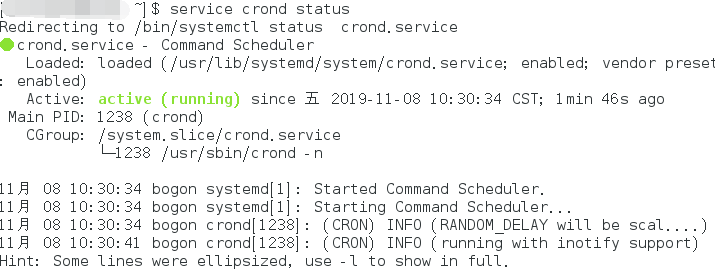When a project goes online, it often needs to back up the database regularly to deal with uncertain environment and unknown problems. It is arranged as follows:
What is crond?
crond and crontab are inseparable. Crontab is a command, common in Unix and Unix like operating systems, which is used to set periodically executed instructions. The command reads the instructions from the standard input device and stores them in a crontab file for later reading and execution. It comes from the Greek word chronos(χ ρόο ο), which originally means time.
And crond is its daemons. cron service is a scheduled service. You can add or edit tasks to be scheduled through crontab command.
crond has been installed in the default CentOS 7.2. If not, you can install it through: yum install crontabs
To see if the crontab service is set to boot:
systemctl list-unit-files | grep enable | grep crond
View crontab status
service crond status
On / off
//Start service
service crond start
//Shut down service
service crond stop
//Restart service
service crond restart
//Reload configuration
service crond reload
Writing scheduled task command format
min hour day month dayofweek command
Time share day month week order
crontab command
Function: set the timer.
Syntax: crontab [- U < user name >] [profile] or crontab [- U < user name >] [- ELR]
Explanation: cron is a resident service, which provides the function of timer, allowing users to execute preset instructions or programs at a specific time. As long as the user can edit the timer configuration file, the timer function can be used. Its configuration file format is as follows: Minute Hour Day Month DayOFWeek Command
Parameters:
-e edit the timer settings for the user.
-l lists the timer settings for the user.
-r delete the timer settings for this user.
-U < user name > specifies the user name to set the timer.
The first column represents minute 1-59, and each minute is represented by * or * / 1
The second column represents hours 1-23 (0 represents zero point)
The third column represents the date 1-31
The fourth column represents the months from January to December
The fifth column identification number is from 0 to 6 (0 means Sunday)
Column 6 commands to run
The specific time operations are as follows:
1. Check the status of crond

2. Write the database scheduled backup script as follows:
#!/bin/bash #################################################################################################################### ### ###Descipt: this script is used for kingbase database backup,before you run it,you should set the variables such as ### kdb_home,kdbback_dest,kdb_user,kdb_pass,kdb_host,kdb_port,kdb_list,keep_time and so on. ### #################################################################################################################### ####################### variable define ########################## # Database installation directory kdb_home="/home/XXXXX/Kingbase" # Target path for database backup kdbback_dest="/home/XXXXX/dbbackup" # Database user name kdb_user="username" # Database user password kdb_pass="password" # Database port number kdb_port="54321" # Database access ip kdb_host="127.0.0.1" # The mode of database. Multiple modes can be separated by commas, such as "TEST,SAMPLE" kdb_list="DBNAME" keep_time="7" date=$(date '+%Y%m%d%H') kdbback_final="${kdbback_dest}/kdbback_final" LD_LIBRARY_PATH="${kdb_home}/unixodbc/lib:${kdb_home}/lib:${kdb_home}/bin" ####################### kingbase backup dest test ################## [ -d ${kdbback_dest} ] || mkdir -p ${kdbback_dest} [ -d ${kdbback_final} ] || mkdir -p ${kdbback_final} ####################### kingbase backup start ####################### cd ${kdbback_dest} export LD_LIBRARY_PATH=$LD_LIBRARY_PATH for db in `echo $kdb_list | sed 's/,/ /g'`; do [ -d ${db} ] || mkdir -p ${db} cd ${db} ##### kingbase server check as follows ${kdb_home}/bin/isql -h ${kdb_host} -p ${kdb_port} -U ${kdb_user} -W ${kdb_pass} -c "select now();" TEMPLATE2 > /dev/null 2>&1 if [ $? -ne 0 ] ;then echo "${date} sorry, please run the script in a kingbase server" >> backup_${db}_${date}.log mv backup_${db}_${date}.log ${kdbback_final} exit 1 else echo "${date} kingbase server is ok,kingbase backup ${db} is beginning ..." >> backup_${db}_${date}.log fi ##### end ##### kingbase backup files process as follows ${kdb_home}/bin/sys_dump -p ${kdb_port} -U ${kdb_user} -W ${kdb_pass} -h ${kdb_host} -f ${db}_${date}.KDMP ${db} >> backup_${db}_${date}.log 2>&1 if [ $? -eq 0 ] ;then tar zcvf ${db}_${date}.tar.gz ${db}_${date}.KDMP* if [ $? -eq 0 ] ;then rm -f ${db}_${date}.KDMP* else mv ${db}_${date}.KDMP* ${kdbback_final} fi find . -mtime +${keep_time} -name ${db}'_*' | xargs -I {} rm {} else rm -f ${db}_${date}.KDMP* fi ###### end ###### kingbase backup log files process as follows tar zcvf backup_log_${db}_${date}.tar.gz backup_${db}_${date}.log if [ $? -eq 0 ] ;then rm -f backup_${db}_${date}.log else mv backup_${db}_${date}.log ${kdbback_final} fi find . -mtime +${keep_time} -name backup_log_${db}'_*' | xargs -I {} rm {} ###### end cd ${kdbback_dest} done exit 0
3. crontab setting
Execute "contab -e"
Write the following statement and execute it every five minutes
*/5 * * * / usr/local/backup.sh (path of script)
4. Start crond
service crond start

You can check the execution status through cd /var/spool/mail / user file
In case of insufficient permission, you can empower as follows:
chmod 777 backup.sh
Reload:
service crond reload
So far